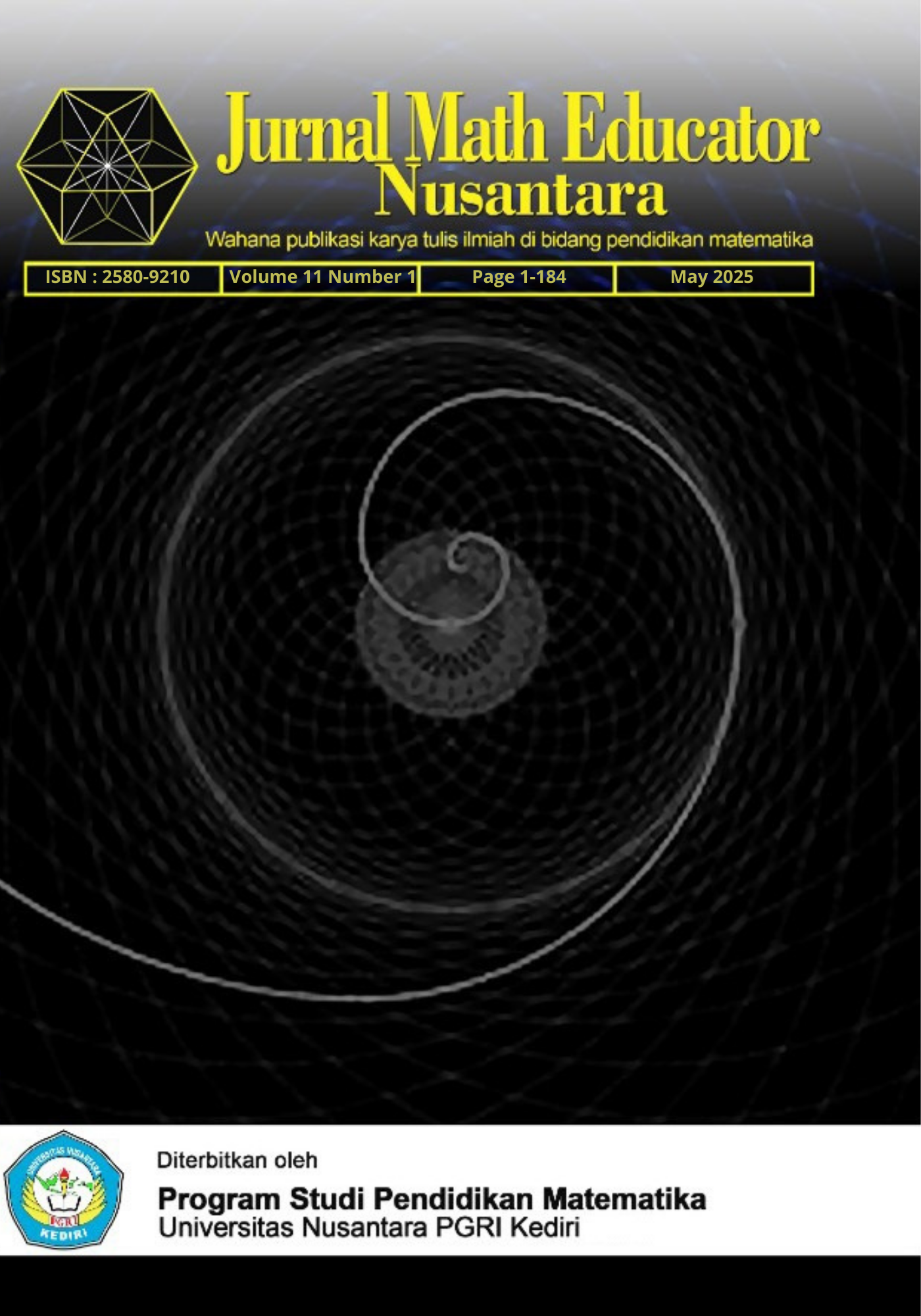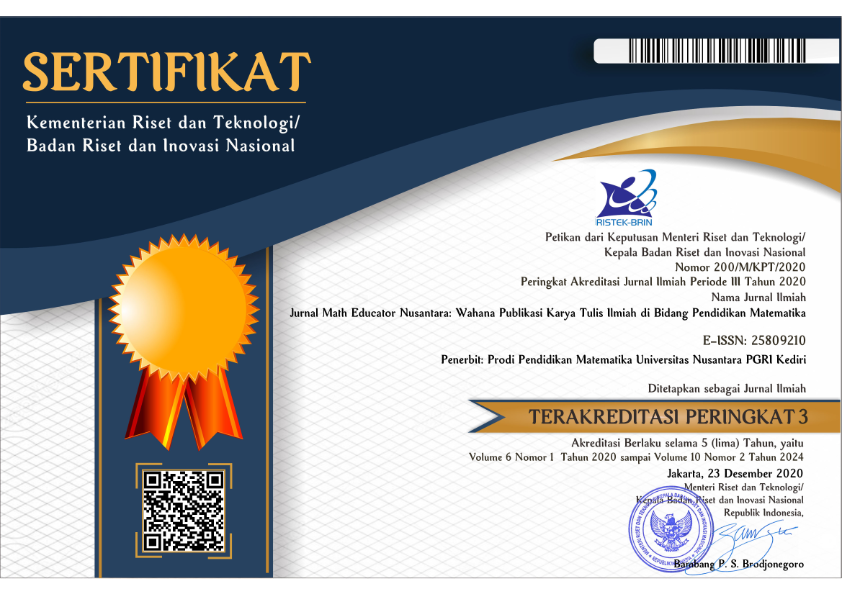Interactive matrix website: Facilitating discovery learning to improve students' mathematical literacy skills
DOI:
https://doi.org/10.29407/jmen.v11i1.25194Keywords:
literacy mathematics, matrix, website, ADDIE, interactiveAbstract
This research is motivated by the low mathematical literacy skills of students in Indonesia, which is an important skill for the application of mathematics in daily life. The purpose of this study is to develop an interactive website based on google sites to improve students' mathematical literacy skills, especially in matrix materials. The method used in this study is the ADDIE (Analysis, Design, Development, Implementation, Evaluation) model, which involves students of grade XI social studies in Yogyakarta as participants. Data is collected through tests (pre-test and post-test) and non-tests (questionnaires and observations) to get a comprehensive picture of the effectiveness of the website developed. Data analysis is carried out qualitatively and quantitatively to assess the validity, practicality, and effectiveness of the product. The results of the study showed that the website developed met the validity criteria of material and media experts, and was considered very practical by teachers and students, with an average learning implementation of 90.25%. The effectiveness test using the paired sample t-test showed a significant increase between the pre-test and post-test scores, with the average post-test reaching 84.84, which exceeded the minimum completeness criteria (KKTP) set. In addition, more than 75% of students have successfully achieved KKTP. The implication of this study is that the interactive website developed can be an effective tool in improving students' mathematical literacy skills, so it is expected to help students better understand mathematical concepts and apply them in daily life. This research makes a positive contribution to efforts to improve the quality of mathematics education in Indonesia
References
Amalia, L., Makmuri, M., & Hakim, L. E. (2024). earning design: To improve mathematical problem-solving skills using a contextual approach. JIIP - Jurnal Ilmiah Ilmu Pendidikan, 7(3), 2353–2366. https://doi.org/10.54371/jiip.v7i3.3455
Atsnan, M. F., Gazali, R. Y., & Nareki, M. L. (2018). Pengaruh pendekatan problem solving terhadap kemampuan representasi dan literasi matematis siswa. Jurnal Riset Pendidikan Matematika, 5(2), 135–146. https://doi.org/10.21831/jrpm.v5i2.20120
Banuwa, A. K., & Susanti, A. N. (2022). Evaluasi Skor Pre-Test dan Post-Test Peserta Pelatihan Teknis New SIGA di Perwakilan BKKBN Provinsi Lampung. Jurnal Ilmiah Widyaiswara, 1(2), 77–85. https://doi.org/10.35912/jiw.v1i2.1266
Bito, N., Nusantri, E. D., Hadjaratie, L., Katili, N., Hasdiana, I., Badu, S. Q., & Hulukati, E. (2024). Efektivitas Rancangan Media Pembelajaran Berbasis Teknologi Informasi dalam Meningkatkan Literasi Numerasi di SMP Negeri 11 Gorontalo. Jurnal Mathedu, 7(1), 1–11. https://doi.org/10.31314/jmathedu.v7i1.21141
Espinosa, E. O. (2021). Developing mathematical literacy in the context of the Fourth Industrial Revolution. IGI Global, Business Science Reference. https://www.igi-global.com/book/developing-mathematical-literacy-context-fourth/244267
Faradayanti, K. A., Endryansyah, J., & Agung, A. I. (2020). Kepraktisan Media Pembelajaran Berbasis Web Untuk Menunjang E-Learning pada Mata Pelajaran Instalasi Motor Listrik di SMK. Jurnal Pendidikan Teknik Elektro, 9(03), 675–683. https://doi.org/10.26740/jpte.v9n03.p675-683
Farib, P. M., Ikhsan, M., & Subianto, M. (2019). Proses berpikir kritis matematis siswa sekolah menengah pertama melalui discovery learning. Jurnal Riset Pendidikan Matematika, 6(1), 99–117. https://doi.org/10.21831/jrpm.v6i1.21396
Hadiana, A. (2023). Efektivitas Media Pembelajaran Interaktif Berbasis Wordwall Terhadap Keterampilan Berpikir Kritis dan Hasil Belajar Peserta Didik. Polynom: Jurnal Pendidikan Matematika, 3(1), 223–236. https://doi.org/10.14421/polynom.2023.301.1-9
Islanda, E., & Darmawan, D. (2023). Pengembangan Google Sites Sebagai Media Pembelajaran untuk Meningkatkan Prestasi Belajar Siswa: The Development of Google Sites as an Instructional Media to Enhance Students' Learning Achievement. Jurnal Teknodik, 51–62. https://doi.org/10.32550/teknodik.vi.991
Lestari, P. S., & Utami, R. D. (2022). PENGEMBANGAN MEDIA PEMBELAJARAN KOBELA PADA MUATAN MATEMATIKA KELAS 3 SEKOLAH DASAR. AKSIOMA: Jurnal Program Studi Pendidikan Matematika, 11(4), 2626. https://doi.org/10.24127/ajpm.v11i4.6104
Maralova, B. (2024). Development and Cultivation of Mathematical Literacy: A Pedagogical Perspective. Eurasian Science Review An International Peer-Reviewed Multidisciplinary Journal, 2(2), 94–99. https://doi.org/10.63034/esr-55
Masfufah, R., & Afriansyah, E. A. (2021). Analisis Kemampuan Literasi Matematis Siswa melalui Soal PISA. Mosharafa: Jurnal Pendidikan Matematika, 10(2). http://journal.institutpendidikan.ac.id/index.php/mosharafa
Maskar, S., Puspaningtyas, N. D., Fatimah, C., & Mauliya, I. (2021). Catatan Daring Matematika: Pelatihan Pemanfaatan Google Site Sebagai Media Pembelajaran Daring. Community Development Journal: Jurnal Pengabdian Masyarakat, 2(2), 487–493. https://doi.org/10.31004/cdj.v2i2.1979
Maysarah, S., Saragih, S., & Napitupulu, E. (2023). PENINGKATAN KEMAMPUAN LITERASI MATEMATIK DENGAN MENGGUNAKAN MODEL PROJECT-BASED LEARNING. AKSIOMA: Jurnal Program Studi Pendidikan Matematika, 12(1), 1536. https://doi.org/10.24127/ajpm.v12i1.6627
Nasrina, A., Purba, H. S., & Mahardika, A. I. (2021). Media Interaktif Berbasis Web pada Pembelajaran Bangun Ruang Sisi Lengkung dengan Metode Drill and Practice. Computing and Education Technology Journal, 1(1), 11–27.
Oktiningrum, W., & Hartono, Y. (2016). Developing Pisa-Like Mathematics Task With Indonesia Natural And Cultural Heritage As Context To Assess Students'. Mathematical Literacy. Journal on Mathematics Education, 7(1), 1–8. https://jme.ejournal.unsri.ac.id/index.php/jme/
Panjaitan, W. A., Simarmata, E. J., Sipayung, R., & Silaban, P. J. (2020). Upaya Meningkatkan Hasil Belajar Siswa Menggunakan Model Pembelajaran Discovery Learning di Sekolah Dasar. Jurnal Basicedu, 4(4), 1350–1357. https://doi.org/10.31004/basicedu.v4i4.549
Rahmawati, D., Suyitno, A., & Rochmad, R. (2022). Desain dan Uji Coba Media Pembelajaran Menggunakan Multimedia Interaktif Lectora Inspire pada Materi Larutan Penyangga. Journal of Chemistry and Education Integration, 1(1), 34–44. https://doi.org/10.24014/jcei.v1i1.15887
Rezeki, S., Dahlia, A., & Amelia, S. (2023). Pengembangan Media Pembelajaran Matematika Menggunakan Aplikasi Wordwall Untuk Peserta Didik Fase E. AKSIOMA: Jurnal Program Studi Pendidikan Matematika, 12(3), 3136. https://doi.org/10.24127/ajpm.v12i3.7188
Rosiyana, R. (2021). Pemanfaatan Media Pembelajaran Google Sites Dalam Pembelajaran Bahasa Indonesia Jarak Jauh Siswa Kelas Vii Smp Islam Asy-Syuhada Kota Bogor. Jurnal Ilmiah KORPUS, 5(2), 217–226. https://doi.org/10.33369/jik.v5i2.13903
Said, A. R., Sidik Iriansyah, H., & Huzaefah, O. (2023). Pengembangan Media Pembelajaran Multimedia Interaktif Berbasis WEB Google Sites Untuk Meningkatkan Motivasi Belajar Siswa SMPN I Teluknaga Tangerang. Jurnal Citizenship Virtues, 2023(2), 544–558. https://doi.org/10.37640/jcv.v3i2.1872
Saputra, H., & Octaria, D. (2022). Pengembangan Media Pembelajaran Berbasis Web Google Sites Pada Materi Turunan Fungsi. Jurnal Derivat, 9(2), 123–135. https://doi.org/10.31316/jderivat.v9i2.4072
Saputri, D., Mellisa, H., N, & Fauziah, N. (2023). Lembar Validasi: Instrumen yang Digunakan Untuk Menilai Produk yang Dikembangkan Pada Penelitian Pengembangan Bidang Pendidikan. Biology and Education Journal, 3(2), 133–151. https://doi.org/10.25299/baej.2023.15347
Setiawan, D., Pramudibyanto, H., & Dewi, R. K. (2019). The utilization of Google Sites as web-based learning media in elementary school. Journal of Education and Learning (EduLearn), 13(3), 440–446. https://doi.org/10.11591/edulearn.v13i3.13964
Sodiq, M., Mahfud, H., & Adi, F. P. (2021). Persepsi guru dan peserta didik terhadap penggunaan aplikasi berbasis web "Quizizz" sebagai media pembelajaran di sekolah dasar. Jurnal Didaktik Dwija Indria, 9(3). https://jurnal.uns.ac.id/JDDI/article/view/49324
Syahdela, R., Anwar, L., & Pratama, R. (2023). The effectiveness of interactive websites (Quizizz) in improving students’ mathematical literacy and learning motivation. Jurnal Pendidikan Matematika dan Sains, 11(2), 98–107. https://doi.org/10.1234/jpms.v11i2.4567
Uleng, I., Rohana, R., & Isroqmi, A. (2023). Pengembangan Media Pembelajaran Pada Materi Matriks Menggunakan Web Google Sites Berbantuan Game Edukasi Wordwall. Laplace : Jurnal Pendidikan Matematika, 6(2), 466–484. https://doi.org/10.31537/laplace.v6i2.1462
Ulia, N., & Kusmaryono, I. (2021). Mathematical disposition of students', teachers, and parents in distance learning: A survey. Premiere Educandum : Jurnal Pendidikan Dasar Dan Pembelajaran, 11(1), 147. https://doi.org/10.25273/pe.v11i1.8869
Widoyoko, E. P. (2017). Evaluasi Program Pelatihan. Pustaka Belajar. https://balaiyanpus.jogjaprov.go.id/opac/detail-opac?id=299962
Yerizon, Y., & Sarti, L. (2021). Pengembangan Lembar Kerja Peserta Didik Berbasis Discovery Learning Pada Materi Matriks untuk Peserta Didik Kelas XI SMA. AKSIOMA: Jurnal Program Studi Pendidikan Matematika, 10(4), 2879. https://doi.org/10.24127/ajpm.v10i4.4193
Downloads
Published
Issue
Section
License
Copyright (c) 2025 Eugenia Natalia Lawang, Sri Andayani

This work is licensed under a Creative Commons Attribution 4.0 International License.
Authors who publish with this journal agree to the following terms:
- Copyright on any article is retained by the author(s).
- The author grants the journal, the right of first publication with the work simultaneously licensed under a Creative Commons Attribution License that allows others to share the work with an acknowledgment of the work’s authorship and initial publication in this journal.
- Authors are able to enter into separate, additional contractual arrangements for the non-exclusive distribution of the journal’s published version of the work (e.g., post it to an institutional repository or publish it in a book), with an acknowledgment of its initial publication in this journal.
- Authors are permitted and encouraged to post their work online (e.g., in institutional repositories or on their website) prior to and during the submission process, as it can lead to productive exchanges, as well as earlier and greater citation of published work.
- The article and any associated published material is distributed under the Creative Commons Attribution-ShareAlike 4.0 International License














